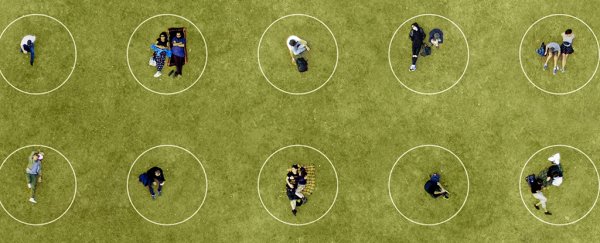It's well established at this point that the older you are, the more likely you are to have a severe case of COVID-19. However, researchers haven't been sure if that's because older people are more likely to catch the virus in the first place, or just end up more severely affected once they've caught it.
We still don't have all the answers, but a new model by a team of researchers in Japan has suggested that your age is unlikely to affect your susceptibility to the virus, just the chance of getting a severe case, or dying.
The researchers dived deep into the data of three countries – Italy, Spain and Japan - with very different COVID-19 numbers, but all with well-recorded health data.
Up until May 29, Italy had 382.3 confirmed cases per 100,000 people, Spain had 507.2, and Japan had just 13.2.
The team also looked at the age distribution of COVID-19 mortality, as well as the basic reproduction number (R0). R0 tells us how many people, on average, contract the virus from an infected person. They found that the age distribution was very similar in all countries, but the R0 was quite different.
"Among Italy, Spain, and Japan, the age distributions of COVID-19 mortality show only small variation even though the number of deaths per country shows large variation," the team writes in their new paper.
"To understand the determinant for this situation, we constructed a mathematical model describing the transmission dynamics and natural history of COVID-19 and analysed the dataset of mortality in Italy, Spain, and Japan."
They also factored in for each age group the estimated human-to-human contact level, and the restriction levels each country was under, which influence the R0.
If the proportion of cases in each age group is similar in all three countries (you can see this on the graph below), what is causing it?
 (Omori et al., Scientific Reports, 2020)
(Omori et al., Scientific Reports, 2020)
The team found that when they modelled the data to suggest that age doesn't influence severity or mortality, the susceptibility had to be unrealistically different to make the model work. This makes sense based on what we know of the virus so far.
Instead, the model indicated that susceptibility probably doesn't change depending on your age, but age did reflect severity and mortality.
"Our study revealed that if the mortality rate or the fraction of symptomatic infections among all COVID-19 cases does not depend on age, then unrealistically different age-dependencies of susceptibilities against COVID-19 infections between Italy, Japan, and Spain are required to explain the similar age distribution of mortality but different basic reproduction numbers (R0)," the team writes.
"Although we cannot fully reject the existence of age-dependency in susceptibility, our results suggest that it does not largely depend on age, but rather that age-dependency in severity highly contributes to the formation of the observed age distribution in mortality."
The model therefore indicated (using these data at least) that the susceptibility to getting COVID-19 is pretty similar across age groups.
This isn't the whole story; the researchers suggest that we need more data – such as accurate case fatality rates - to determine the susceptibility in age groups more definitively. This is quite hard to investigate, so the team recommends an intensive large-scale study with real-time detections.
Unfortunately, that's unlikely any time soon, but hopefully more epidemiological modelling will be the next best thing. A potentially easier investigation could be looking at other countries to see if the model still holds up.
The research has been published in Scientific Reports.
